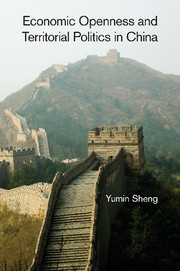Book contents
- Frontmatter
- Contents
- List of Tables
- List of Figures
- Acknowledgments
- List of Abbreviations
- 1 The Territorial Politics of Economic Openness in China
- 2 Globalization, Institutions, and Domestic Territorial Politics: A Theoretical Framework
- 3 Economic Openness and Its Regional Dimension
- 4 Central Political Control via the CCP
- 5 Global Market Integration and Central Political Control
- 6 Consequences for Fiscal Extraction and Economic Growth
- 7 Globalization, Single-Party Rule, and China's Transitions
- References
- Index
5 - Global Market Integration and Central Political Control
Published online by Cambridge University Press: 10 November 2010
- Frontmatter
- Contents
- List of Tables
- List of Figures
- Acknowledgments
- List of Abbreviations
- 1 The Territorial Politics of Economic Openness in China
- 2 Globalization, Institutions, and Domestic Territorial Politics: A Theoretical Framework
- 3 Economic Openness and Its Regional Dimension
- 4 Central Political Control via the CCP
- 5 Global Market Integration and Central Political Control
- 6 Consequences for Fiscal Extraction and Economic Growth
- 7 Globalization, Single-Party Rule, and China's Transitions
- References
- Index
Summary
INTRODUCTION
This chapter empirically investigates how the differential exposure to the global markets by the Chinese provinces affected the degree of political control the provincial governments incurred from the center by analyzing pooled provincial-level time-series cross-section data. As in Chapter 3, I measure the degree of economic openness of a province (that is, the degree to which a province benefits from a linkage to the global markets) with shares of exports and alternatively foreign trade in the provincial GDP. As in Chapter 4, I measure the extent of central political control exercised by the center over the provincial governments via Huang's (1996) notion of the “bureaucratic integration” of the provincial party secretaries, the top-ranking provincial officials.
I find that provinces that engaged in more exports and foreign trade tended to be ruled by the more “bureaucratically integrated” provincial party secretaries predisposed to greater compliance with the policy preferences of the center during the 1978–2005 period. This lends strong empirical support to our hypothesis positing the exercise of more stringent political control over the subnational governments in those richer but more assertive winner provinces by the Chinese national leadership that rules the country via a most centralized political party. The empirical results from this chapter will make three major contributions, one to the broader study of the domestic politics of economic globalization and two to the existing research on China's central-provincial relations in the post-1978 era.
- Type
- Chapter
- Information
- Economic Openness and Territorial Politics in China , pp. 143 - 180Publisher: Cambridge University PressPrint publication year: 2010



